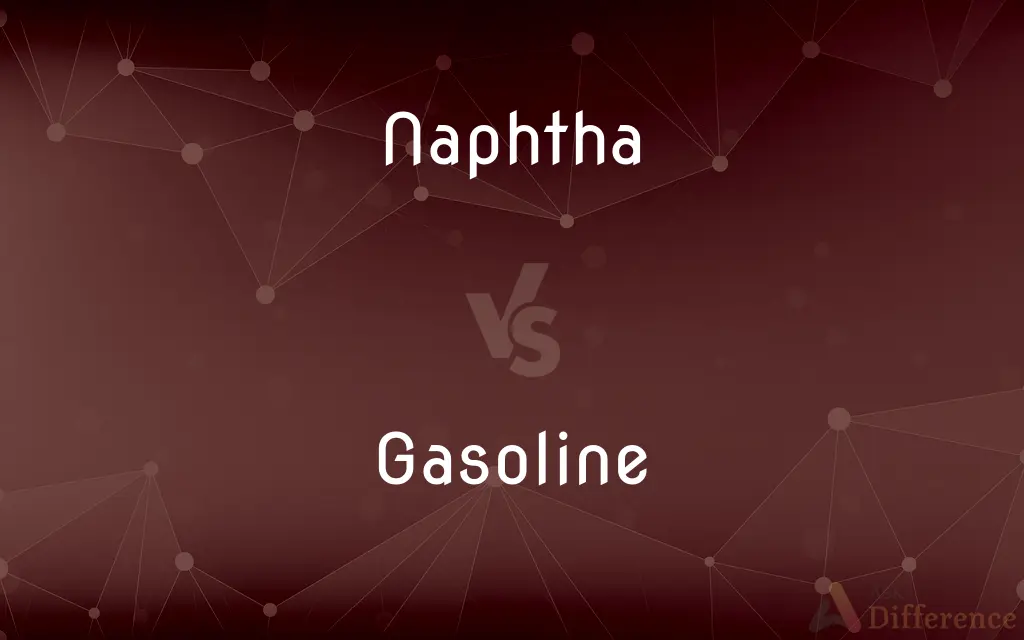Naphtha vs. Gasoline — What's the Difference?
Edited by Tayyaba Rehman — By Fiza Rafique — Updated on September 28, 2023
Naphtha is a flammable liquid hydrocarbon mixture used primarily as feedstock for producing high octane gasoline, while gasoline is a refined petroleum product used as fuel for internal combustion engines.

Difference Between Naphtha and Gasoline
Table of Contents
ADVERTISEMENT
Key Differences
Naphtha and gasoline both originate from crude oil, undergoing different refining processes to serve varied applications. While naphtha is predominantly a feedstock for producing chemicals and high octane gasoline, gasoline stands as a primary fuel for internal combustion engines.
The refining process for naphtha involves distilling crude oil at temperatures between 30°C and 200°C, resulting in a mixture that serves as a base for several chemical products. In contrast, gasoline undergoes additional refining to achieve the specific properties required for vehicle fuel.
From a chemical standpoint, naphtha encompasses a broader range of hydrocarbons than gasoline. Naphtha can consist of both light and heavy hydrocarbons, which can be further processed or cracked to produce other substances. Gasoline, on the other hand, contains specific hydrocarbons that ignite and burn efficiently in vehicle engines.
While both naphtha and gasoline are highly flammable, their applications differ substantially. Industries leverage naphtha as a solvent or in petrochemical production. Conversely, gasoline's primary use is fueling vehicles, ensuring smooth ignition and efficient burning.
It's crucial to understand that while gasoline can be derived from naphtha through further refining and processing, naphtha in its raw form isn't suitable for most vehicle engines due to its distinct chemical composition and properties.
ADVERTISEMENT
Comparison Chart
Primary Use
Feedstock for chemicals
Fuel for vehicles
Refining Temperature
30°C to 200°C
Higher than naphtha, with additional steps
Hydrocarbon Range
Broader range
Specific for efficient burning in engines
Major Applications
Solvent, petrochemical production
Vehicle fuel
Suitability for Vehicle Engines
Not suitable in raw form
Designed for efficient ignition
Compare with Definitions
Naphtha
Used in the production of plastics and chemicals.
Several everyday items are produced using naphtha as a base material.
Gasoline
Highly flammable and used globally.
Gasoline prices fluctuate based on global oil markets.
Naphtha
A flammable liquid hydrocarbon mixture.
Naphtha is often used as a solvent in industries.
Gasoline
Contains additives to enhance performance.
Gasoline often has detergents to keep engines clean.
Naphtha
Feedstock for petrochemical production.
Petrochemical plants use naphtha as a primary input.
Gasoline
Fuels internal combustion engines.
Cars, motorcycles, and some generators run on gasoline.
Naphtha
Naphtha ( or ) is a flammable liquid hydrocarbon mixture. Mixtures labelled naphtha have been produced from natural gas condensates, petroleum distillates, and the distillation of coal tar and peat.
Gasoline
A refined petroleum product for engines.
I filled my car with gasoline this morning.
Naphtha
Any of several highly volatile, flammable liquid mixtures of hydrocarbons distilled from petroleum, coal tar, and natural gas and used as fuel, as solvents, and in making various chemicals. Also called benzine, ligroin, petroleum ether, white gasoline.
Gasoline
Undergoes specific refining for vehicle suitability.
The quality of gasoline affects engine performance.
Naphtha
(Obsolete) Petroleum.
Gasoline
Gasoline () or petrol () (see the etymology for naming differences and the use of the term gas) is a transparent, petroleum-derived flammable liquid that is used primarily as a fuel in most spark-ignited internal combustion engines. It consists mostly of organic compounds obtained by the fractional distillation of petroleum, enhanced with a variety of additives.
Naphtha
(dated) Naturally occurring liquid petroleum.
Gasoline
A volatile mixture of flammable liquid hydrocarbons derived chiefly from crude petroleum and used principally as a fuel for internal-combustion engines.
Naphtha
Any of a wide variety of aliphatic or aromatic liquid hydrocarbon mixtures distilled from petroleum or coal tar, especially as used in solvents or petrol.
Gasoline
A flammable liquid consisting of a mixture of refined petroleum hydrocarbons, mainly used as a motor fuel; petrol.
Naphtha
The complex mixture of volatile, liquid, inflammable hydrocarbons, occurring naturally, and usually called crude petroleum, mineral oil, or rock oil.
Gasoline
(countable) Any specific kind of gasoline.
The refinery produces a wide range of gasolines.
Naphtha
One of several volatile inflammable liquids obtained by the distillation of certain carbonaceous materials and resembling the naphtha from petroleum; as, Boghead naphtha, from Boghead coal (obtained at Boghead, Scotland); crude naphtha, or light oil, from coal tar; wood naphtha, from wood, etc.
Gasoline
Marijuana, especially very potent or high quality.
Naphtha
Any of various volatile flammable liquid hydrocarbon mixtures; used chiefly as solvents
Gasoline
(slang) An alcoholic beverage made of vodka and energy drink.
Naphtha
Distilled between 30°C and 200°C from crude oil.
Naphtha has a specific distillation range in the refining process.
Gasoline
Made from or using gasoline.
Naphtha
Can be processed to produce gasoline.
Naphtha undergoes further refining to derive high octane gasoline.
Gasoline
A highly volatile mixture of fluid hydrocarbons, obtained mostly from petroleum, as also by the distillation of bituminous coal. It is used as a fuel for most automobiles and for many other vehicles with internal combustion engines. The gasoline of commerce is typically blended with additives to improve its performance in internal combustion engines. Gasoline was also used in the early 1900's in making air gas, and in giving illuminating power to water gas. See Carburetor.
Gasoline
A volatile flammable mixture of hydrocarbons (hexane and heptane and octane etc.) derived from petroleum; used mainly as a fuel in internal-combustion engines
Common Curiosities
What's the refining temperature for gasoline?
Gasoline undergoes refining at temperatures higher than naphtha, with additional processing steps.
Are both naphtha and gasoline derived from crude oil?
Yes, both originate from crude oil but undergo different refining processes.
What's the primary use of naphtha?
Naphtha is primarily used as feedstock for chemicals and high octane gasoline production.
Can naphtha fuel vehicles directly?
Raw naphtha isn't suitable for most vehicle engines; it needs further refining.
Where is gasoline commonly used?
Gasoline is primarily used as fuel for internal combustion engines in vehicles.
Is naphtha involved in plastic production?
Yes, naphtha serves as a feedstock in petrochemical production, including plastics.
Why is gasoline flammable?
Gasoline is flammable due to its specific hydrocarbon composition, making it suitable as fuel.
Can gasoline be derived from naphtha?
Yes, with further refining and processing, gasoline can be derived from naphtha.
How do the chemical compositions of naphtha and gasoline differ?
Naphtha has a broader range of hydrocarbons, while gasoline contains specific hydrocarbons for efficient engine burning.
What other products can be derived from naphtha?
Apart from gasoline, naphtha is also used to produce chemicals, solvents, and plastics.
Which has a broader range of hydrocarbons, naphtha or gasoline?
Naphtha encompasses a broader range of hydrocarbons than gasoline.
Share Your Discovery

Previous Comparison
Pup vs. Puppy
Next Comparison
Rule vs. GuidelineAuthor Spotlight
Written by
Fiza RafiqueFiza Rafique is a skilled content writer at AskDifference.com, where she meticulously refines and enhances written pieces. Drawing from her vast editorial expertise, Fiza ensures clarity, accuracy, and precision in every article. Passionate about language, she continually seeks to elevate the quality of content for readers worldwide.
Edited by
Tayyaba RehmanTayyaba Rehman is a distinguished writer, currently serving as a primary contributor to askdifference.com. As a researcher in semantics and etymology, Tayyaba's passion for the complexity of languages and their distinctions has found a perfect home on the platform. Tayyaba delves into the intricacies of language, distinguishing between commonly confused words and phrases, thereby providing clarity for readers worldwide.
















































